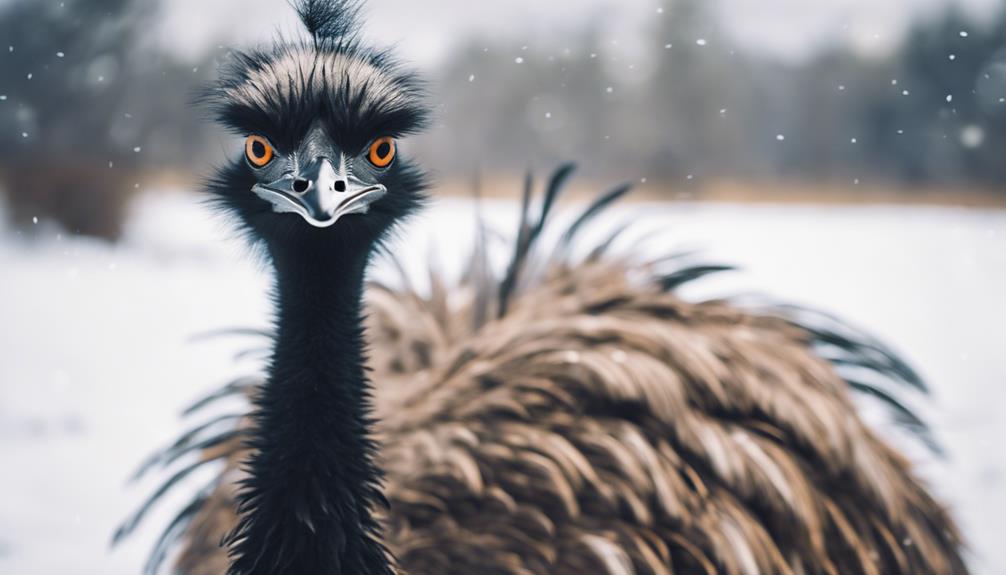
When caring for emus, understanding the differences between winter and summer care is crucial for their well-being. Ensuring proper shelter, diet, grooming, hydration, and exercise routines tailored to each season can significantly impact their health and happiness. By making informed choices based on the specific needs of emus during different times of the year, you can provide them with the best possible care and ensure they thrive in any weather condition.
Key Takeaways
- Adjust diet to provide more energy-rich foods in winter for warmth.
- Ensure insulated shelter in winter to prevent illnesses like frostbite.
- Provide ample shade and ventilation in summer to prevent overheating.
- Monitor hydration closely, offering more water options in summer.
- Consider grooming practices and hydration needs to suit each season.
Emu Shelter Needs
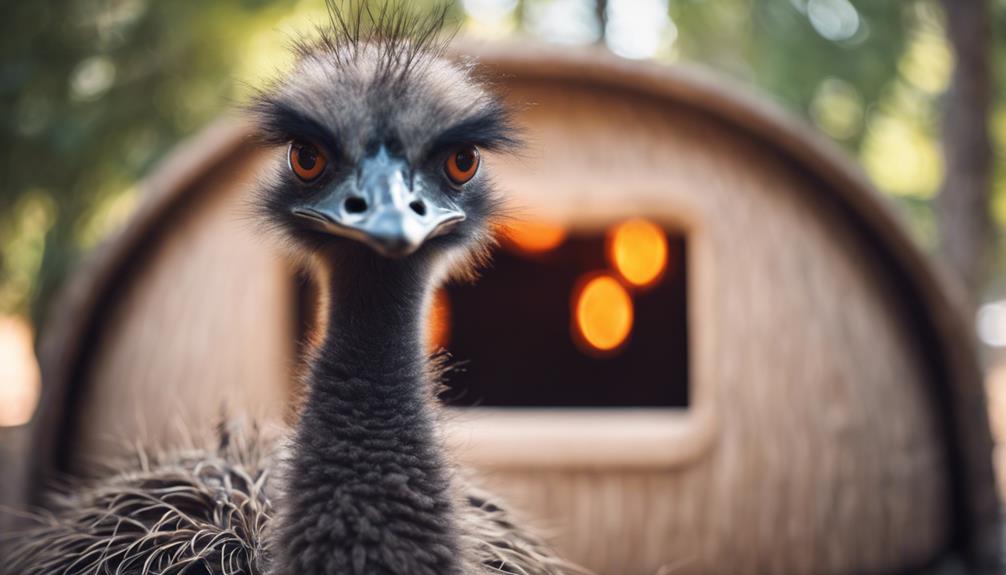
Emus require adequate shelter to protect them from extreme weather conditions throughout the year. Providing a secure and sturdy shelter is crucial for maintaining the well-being and health of your emus. In winter, insulated shelters are essential to shield them from the cold and dampness, preventing illnesses such as frostbite. Ensure the shelter is draft-free and offers ample space for the emus to move comfortably. During summer, the shelter should have proper ventilation to prevent overheating. Emus are sensitive to high temperatures, so it's vital to provide shade and adequate airflow to keep them cool.
When designing the shelter for your emus, consider the size of your flock. Each emu should have sufficient space to rest and move around without overcrowding. The shelter should also be easy to clean and maintain to uphold optimal hygiene levels. Remember, a well-constructed shelter not only protects your emus but also promotes their overall welfare and productivity.
Dietary Adjustments
When adjusting the diet of your emus for seasonal changes, it is essential to consider their nutritional requirements and environmental conditions. Emus have specific dietary needs that vary with the seasons. In winter, when temperatures drop, emus require more energy to stay warm. Adjusting their diet during this time is crucial to ensure they receive the necessary nutrients for maintaining their health and well-being.
To help you understand the dietary adjustments needed for your emus in different seasons, below is a table detailing some key considerations:
| Season | Dietary Adjustment | Nutritional Needs Met |
|---|---|---|
| Winter | Increase energy-rich foods | Adequate energy for warmth |
| Summer | Provide more hydration options | Proper hydration in hot weather |
| Fall | Supplement with vitamins | Boost immune system |
Grooming in Cold Weather
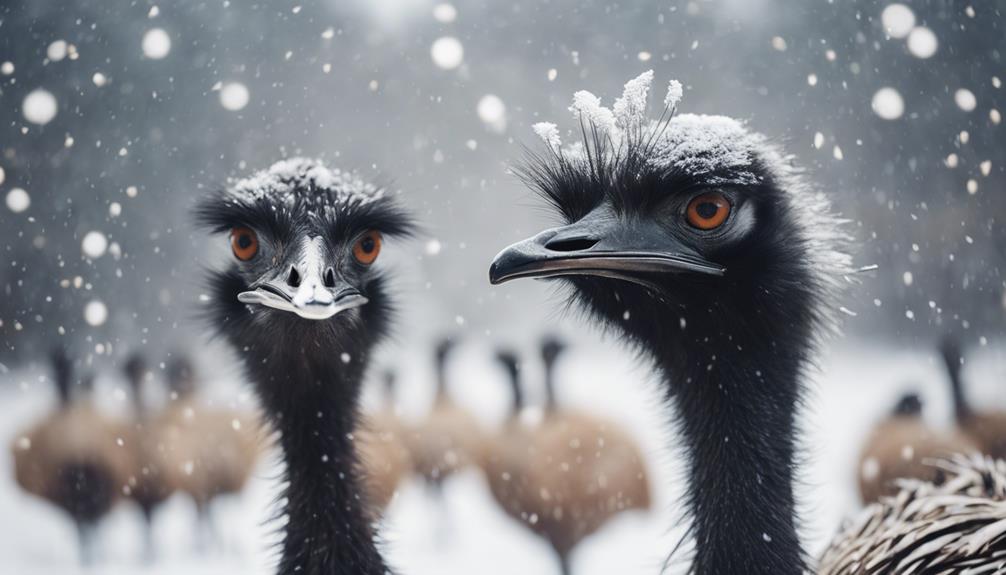
In cold weather, maintaining proper grooming practices for your emus is essential to help them stay healthy and comfortable. During winter, your emus' feathers serve as natural insulation, trapping air to keep them warm. However, regular grooming is still vital. Brushing your emus helps to remove dirt, dust, and loose feathers that can hinder their ability to regulate body temperature efficiently.
Inspect their feathers for signs of mites or lice, as these pests can exacerbate cold-related stress. Emus are prone to dry skin in winter, so consider using a gentle moisturizing emu oil spray to keep their skin hydrated. Pay attention to their feet as well, ensuring they're clean and free of any debris that could cause discomfort.
A clean and dry living environment is crucial, as damp conditions can lead to health issues. By prioritizing grooming in cold weather, you ensure your emus are well-equipped to thrive even in the harshest conditions.
Hydration Tips
Proper hydration is crucial for ensuring the well-being of your emus, especially during seasonal changes. Emus require a consistent supply of clean and fresh water to maintain their health and vitality. Here are some hydration tips to keep in mind for your emus:
| Hydration Tips | Description |
|---|---|
| Provide Adequate Water | Ensure your emus have access to clean and fresh water at all times. |
| Monitor Water Intake | Keep an eye on how much water your emus are drinking daily. |
| Electrolyte Supplements | Consider adding electrolyte supplements to their water during hot weather. |
| Ice Blocks in Summer | Offer ice blocks or frozen treats to help your emus stay cool and hydrated. |
Exercise Regimen
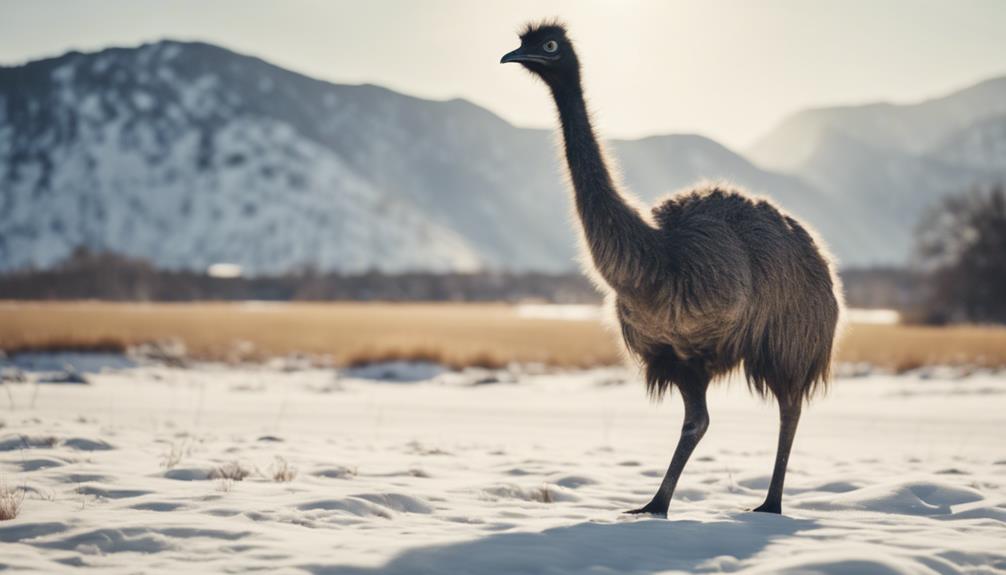
To ensure the optimal health and well-being of your emus, incorporating a suitable exercise regimen is essential. Emus are active creatures that require ample space to move freely. Establish a routine that includes daily walks or runs to keep your emus in prime physical condition. These exercises not only promote muscle strength but also stimulate mental alertness, contributing to overall vitality.
Consider creating a designated area for your emus to roam and explore. Encourage activities that mimic their natural behaviors, such as foraging for food or engaging in playful interactions. Monitoring their exercise levels is crucial to prevent overexertion, especially during hot summer months when heat stress can pose a risk.
Skin Care in Heat
For effective skin care in hot weather, ensure your emus have access to shaded areas and cool water for relief from the heat. Emus are sensitive to high temperatures and can easily become stressed if exposed to prolonged periods of direct sunlight. Providing ample shade allows them to regulate their body temperature and prevent overheating. Additionally, offering cool water sources such as shallow pools or misting systems can help emus stay hydrated and maintain healthy skin.
In hot weather, it's crucial to monitor your emus for signs of heat stress, such as panting, wing drooping, or reduced activity. Taking proactive measures like adjusting their environment, ensuring proper ventilation, and avoiding overcrowding can help prevent heat-related issues. Regularly inspect their skin for any signs of sunburn or irritation, especially on their legs and neck, which are more susceptible to damage from prolonged sun exposure.
Winter Health Concerns
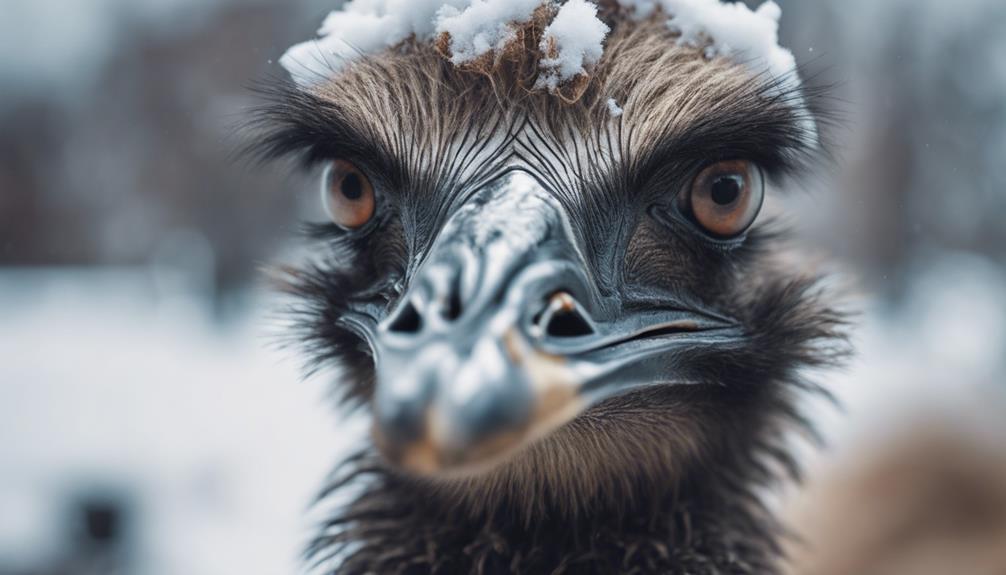
During colder months, your focus shifts to addressing winter health concerns to ensure your emus stay healthy and comfortable in changing temperatures. One primary concern is proper shelter. Emus require a draft-free, dry shelter that protects them from harsh winds and cold temperatures. Ensure adequate bedding such as straw or wood shavings to keep them warm and dry. Additionally, provide access to fresh water at all times, as hydration is essential for overall health during winter.
Monitoring their diet is crucial during this time. Adjust their feed to include more calories to help maintain body heat and energy levels. Consider consulting with a veterinarian or an experienced emu handler to create a suitable winter diet plan. Regular health check-ups are also recommended to catch any potential issues early on.
Lastly, pay attention to their behavior and body condition. Signs of distress or discomfort, such as lethargy or excessive shivering, shouldn't be ignored. By addressing these winter health concerns proactively, you can ensure your emus thrive even in the coldest months.
Summer Safety Precautions
Ensuring optimal summer safety for your emus involves implementing proper heat management strategies. Emus are sensitive to high temperatures, so it's crucial to provide adequate shade in their enclosure. Consider erecting shelters or planting trees to create shady areas where your emus can escape the direct sunlight. Additionally, ensure good ventilation to prevent heat build-up in their living space.
Water is essential for keeping emus cool during the summer months. Provide a constant supply of fresh, clean water for drinking and bathing. Emus enjoy splashing around in water to regulate their body temperature, so consider setting up a shallow pool or misting system for them to cool off.
Regularly monitor your emus for signs of heat stress, such as panting, wing spreading, or decreased activity. If you notice any of these symptoms, take immediate action to cool them down. By proactively implementing these summer safety precautions, you can ensure that your emus thrive even in the hottest months.
Behavioral Changes
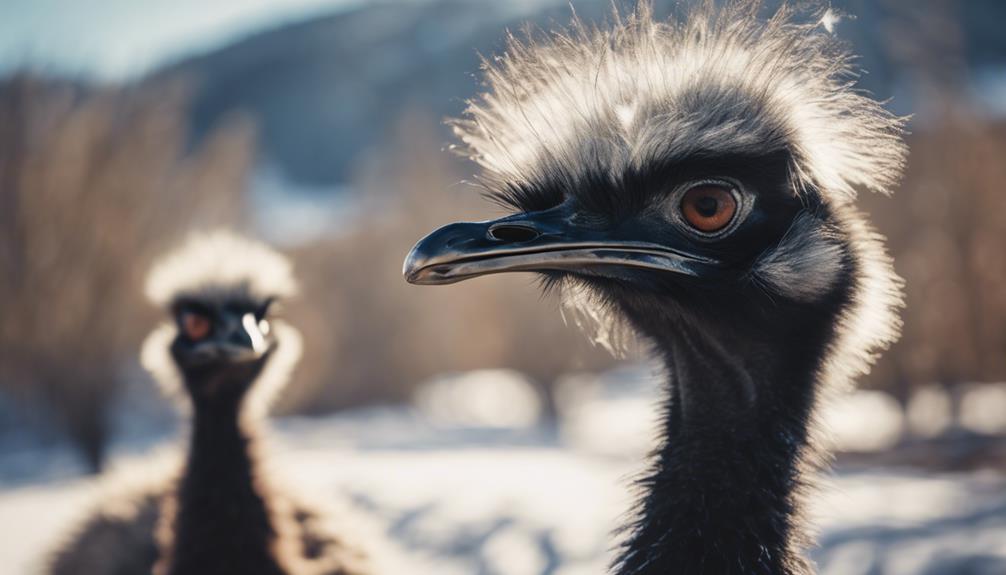
When observing your emus during the summer months, pay close attention to any behavioral changes that may indicate their response to the heat. Emus are known to exhibit certain behaviors in response to high temperatures. One common behavioral change is seeking shade more frequently. You may notice your emus spending more time under trees or shelters to escape the direct sunlight during the hottest parts of the day.
Another behavioral change to look out for is increased panting. Emus regulate their body temperature through panting, especially when it's hot. If you see your emus panting more than usual, it's a sign that they're trying to cool down.
Additionally, emus may become less active during the hottest hours and more active during the cooler parts of the day. This is a natural response to conserve energy and avoid overheating. Providing ample shade, fresh water, and proper ventilation can help your emus stay comfortable and healthy during the summer months.
Environmental Considerations
For optimal care of your emus, it's essential to consider the environmental factors that can influence their well-being throughout the year. Emus thrive in a dry and warm climate, so ensuring proper shelter is crucial. During winter, provide a draft-free shelter with ample bedding to keep your emus warm. Be mindful of any drafts or leaks that could cause discomfort or illness. In summer, shield your emus from direct sunlight and provide adequate shade to prevent overheating. Emus are sensitive to extreme temperatures, so monitoring and regulating the environment is key to their health.
Additionally, maintaining a clean living environment is paramount. Regularly clean and disinfect their living space to prevent the buildup of bacteria and parasites. Proper ventilation is also essential to prevent respiratory issues. Emus require a spacious area to roam and exercise, so ensure they've enough room to move around comfortably. By considering these environmental factors, you can provide a safe and conducive space for your emus year-round.
Seasonal Feeding Schedule

Are you wondering how to adjust your emus' feeding schedule to accommodate the changing seasons? It's crucial to adapt your feeding routine to meet the evolving needs of your emus throughout the year.
In summer, when temperatures are higher, your emus may need more frequent feedings to stay hydrated and energized. Ensure they've access to fresh water at all times and consider providing additional electrolytes to help them cope with the heat.
As winter approaches, your emus' metabolism may slow down, requiring adjustments to their feeding schedule. Increase their access to high-quality feed to help them maintain their body temperature and energy levels. Emus may also benefit from additional sources of fat during the colder months to help them stay warm.
Emu Health Check-ups
To ensure your emus remain healthy and thriving year-round, regular health check-ups are imperative for monitoring their well-being and addressing any potential issues promptly. These check-ups allow you to catch any health concerns early, provide necessary treatments, and maintain the well-being of your emus. Below is a table outlining key aspects of emu health check-ups to guide you in caring for your majestic birds effectively.
| Aspect | Frequency |
|---|---|
| Physical Examination | Annually |
| Parasite Control | Every 3-6 months |
| Vaccinations | As recommended by vet |
Frequently Asked Questions
Can Emus Safely Be Kept in Areas With Extreme Temperature Fluctuations?
Emus can thrive in areas with extreme temperature fluctuations. Proper shelter, food, and water provisions are essential. Monitor their well-being closely during temperature changes. Consult with experts for specific care guidelines to ensure their health and safety.
What Types of Toys or Enrichment Activities Are Suitable for Emus?
To provide suitable enrichment for emus, consider items like hanging feeders filled with treats, large balls for pecking, or shallow pools for splashing. Rotate toys regularly to keep them engaged and mentally stimulated.
How Can Emus Be Protected From Insect Bites During the Summer?
To shield emus from insect bites in summer, apply neem oil or a mix of essential oils like lavender and eucalyptus to their skin. Utilize natural repellents to safeguard them, ensuring their comfort and well-being.
Are There Any Specific Warning Signs of Heatstroke in Emus?
Watch for signs of heatstroke in emus like panting, drooping wings, and lethargy. Act swiftly by providing shade, water, and cooling methods. Prioritize their well-being to prevent heat-related issues. Stay vigilant to ensure their safety.
Do Emus Exhibit Different Behaviors When They Are Cold Versus Hot?
Emus exhibit distinct behaviors in response to temperature changes. When cold, they may huddle together for warmth and fluff up their feathers. In the heat, they might seek shade, pant, and reduce their activity to stay cool.
Conclusion
In conclusion, ensuring proper care for your emus in both winter and summer is essential for their well-being. By providing the necessary shelter, adjusting their diet, grooming them appropriately, offering hydration, maintaining an exercise regimen, and considering environmental factors, you can keep your emus happy and healthy year-round.
Remember, keeping your emus in top shape is as important as saving the world from an alien invasion!




